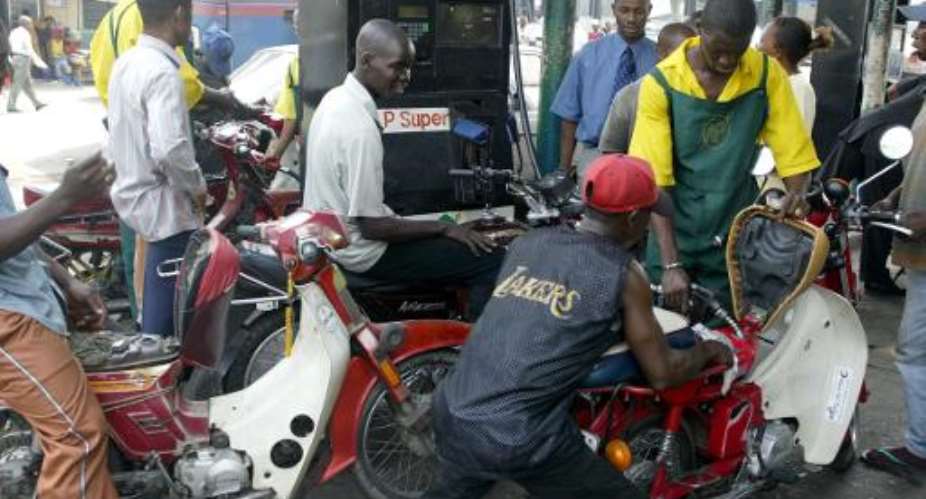Lagos (AFP) - A crippling strike over fuel that brought Nigeria to a near standstill was called off "in the national interest", a union leader said on Tuesday, as the country limped back normal.
"We suspended the strike in the national interest," Tokunbo Korodo, southwest chairman of petrol tanker drivers at the National Union of Petroleum and Natural Gas Workers (NUPENG).
"Nigerians have suffered enough because of the scarcity. The pains and anguish the people were going through were too much," he told AFP.
Agreement was reached on Monday to end the weeks-long crisis, which saw banks close early to save fuel, mobile phone operators warn of an imminent shutdown in services and flights grounded.
Unions, including NUPENG, and industrial groups responsible for supplying and distributing fuel in Nigeria thrashed out a deal at a meeting in the capital Abuja.
No details were given about why the situation was resolved and Korodo said it was "an in-house arrangement among the stakeholders which they did not want to make public".
Finance Minister Ngozi Okonjo-Iweala has accused fuel importers and marketers of holding the country to ransom after they shut depots claiming they were owed some $1 billion (900 million euros) in subsidy payments.
Nigeria is Africa's biggest crude producer, pumping out some two million barrels per day, but it is forced to import petroleum products because of a lack of functioning domestic refineries.
The government pays importers the difference between the lower retail price for consumers and the actual market price in a system that is seen as rife with fraud.
Filling stations that had run dry in recent days were gradually being restocked after fuel depots reopened on Monday evening. Long queues were seen across Nigeria's biggest city, Lagos.
Petrol sells at 87 naira ($0.43, 0.39 euros) per litre. In the Lagos district of Ikorodu, prices were between 150 to 200 naira, down from 300 naira and more on the black market on Monday.
Kehinde Agboola, a civil servant, said he was forced to pay three times the normal bus fare to get to work. "It's depressing," he said.
Boat taxi fares from Bayeku to the Ikoyi island business district were increased from 600 naira to 1,000 naira because businesses shut and there were fewer commuters, one boat operator said.
Nigeria's President Goodluck Jonathan hands over power on Friday to Muhammadu Buhari, whose party has accused the outgoing administration of engineering the crisis.
Church pastor and businessman Chinedu Nwachukwu suggested Jonathan had left a damaging legacy.
"Is this what Jonathan wants Nigeria to remember him for? That he left the nation in ruins and the economy prostrate?"
Korodo said it was expected that fuel stocks would be back to normal by the weekend but said incoming president Buhari needed to tackle the problem as a priority, particularly the issue of refineries.





 Elisu By-election: "If you call yourself a man, boo Chairman Wontumi again" — Bo...
Elisu By-election: "If you call yourself a man, boo Chairman Wontumi again" — Bo...
 Fuel tanker driver escapes with his life after tanker goes up in flames near Suh...
Fuel tanker driver escapes with his life after tanker goes up in flames near Suh...
 Uniform change: ‘Blue and white are brighter colours’ — Kwasi Kwarteng explains ...
Uniform change: ‘Blue and white are brighter colours’ — Kwasi Kwarteng explains ...
 MoE not changing all public basic school uniforms but only newly built ones — Kw...
MoE not changing all public basic school uniforms but only newly built ones — Kw...
 We’re only painting new public basic schools blue and white – Dr. Adutwum clarif...
We’re only painting new public basic schools blue and white – Dr. Adutwum clarif...
 Bawumia has lost confidence in his own govt’s economic credentials – Beatrice An...
Bawumia has lost confidence in his own govt’s economic credentials – Beatrice An...
 I fought WW2 at age 16 – WO1 Hammond shares At Memoir Launch
I fought WW2 at age 16 – WO1 Hammond shares At Memoir Launch
 GRA-SML deal: Regardless of what benefits have been accrued, the contract was aw...
GRA-SML deal: Regardless of what benefits have been accrued, the contract was aw...
 April 26: Cedi sells at GHS13.75 to $1, GHS13.18 on BoG interbank
April 26: Cedi sells at GHS13.75 to $1, GHS13.18 on BoG interbank
 Champion, promote the interest of women if you become Vice President – Prof. Gya...
Champion, promote the interest of women if you become Vice President – Prof. Gya...
